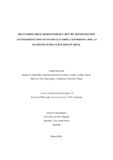Please use this identifier to cite or link to this item:
http://archive.nnl.gov.np:8080/handle/123456789/60| Title: | Recovering from armed conflict: return, reintegration and rehabilitation of Internally Displaced Persons (IDPs) as elements of peace building in Nepal |
| Authors: | Ojha, Chakra Raj |
| Keywords: | Forced migration IDP policy -- Nepal Property restitution Internally displaced persons |
| Issue Date: | 3-Jan-2018 |
| Abstract: | The armed conflict between Maoist insurgents and government security forces (1996 to 2006) has resulted in the internal displacement of many Nepalese people, most particularly, those from remote hill districts to district headquarters, regional and capital cities following the declaration of a State of Emergency in 2001. This thesis undertakes to investigate the experience of people directly caught up in the crises of war and conflict − Internally Displaced Persons (IDPs). A qualitative methodology was adopted using an ethnographic approach to conduct this research. It involved informal discussions, participant observation and in-depth interviews. This thesis reveals that there is a lack of consensus as to the definition of how to identify and register IDPs, a poor estimation of their numbers (with estimates ranging from 25,000 to 400,000), how to address their needs, and about who should be responsible for addressing them. This study emphasises that timely and accurate data collection is needed for determining the numbers and understanding the conditions surrounding internally displaced persons. This is a key step towards designing effective protection responses to internal displacement. Addressing the needs and respecting the rights of IDPs is not only a humanitarian and human rights issue, but also a strategic one affecting peace, security and sustainable development. The research suggests that resolving the displacement problem is inextricably linked to the future of the peace process. The findings of the research study suggest that the commitments of the government of Nepal in relation to internal displacement have not yet materialized into effective implementation of policy and their good intentions. This thesis suggests that introducing a national policy alone is not enough to ensure the protection of IDPs or to end displacement; it is necessary to implement the policy and monitor whether the policy provisions are producing viable results. This research thesis further suggests that the restoration of the property rights of the internally displaced is necessary for the reestablishment of order and the creation of an environment conducive to the successful return, resettlement and reintegration of IDPs. This in turn is linked to the establishment of producing the conditions for a sustainable peace after the end of a violent conflict in Nepal. This research then concludes that solving the internal displacement problem is crucial for building long term peace, and any solution to the problem of internal displacement must include institutionalized property rights for IDPs. This requires the government of Nepal to provide comprehensive support and appropriate action to enable this to happen. |
| Description: | A thesis submitted for the degree of Doctor of Philosophy of the University of New England, School of Humanities, University of New England, Armidale, New South Wales, Australia, 2010. |
| URI: | http://103.69.125.248:8080/xmlui/handle/123456789/60 |
| Appears in Collections: | 300 Social sciences |
Files in This Item:
| File | Description | Size | Format | |
|---|---|---|---|---|
| Chakra-thesis-final.pdf | 4.04 MB | Adobe PDF |  View/Open |
Items in DSpace are protected by copyright, with all rights reserved, unless otherwise indicated.